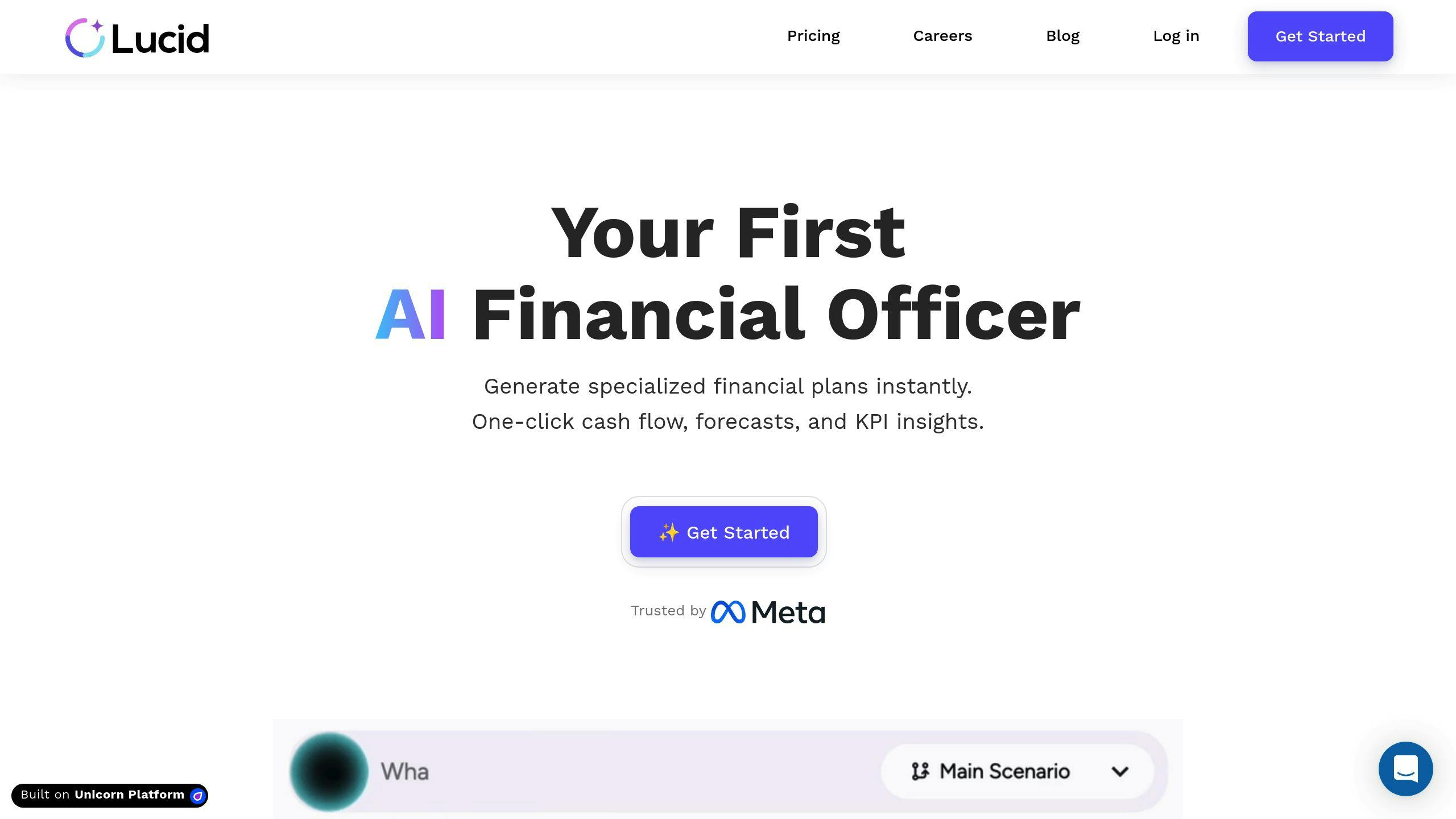AI revenue forecasting helps businesses predict future income using historical data and machine learning. While it’s powerful, ethical concerns can’t be ignored. Key challenges include:
- Bias in Predictions: AI can favor larger companies or specific industries, leading to unfair outcomes.
- Lack of Transparency: Many models act as "black boxes", making it hard to trust or explain forecasts.
- Data Privacy Risks: Protecting sensitive financial and customer data is crucial but difficult, especially for smaller businesses.
To address these issues, companies should focus on improving data quality, making AI models explainable, and implementing ethical guidelines. Tools like Lucid Financials offer features to reduce bias, enhance transparency, and secure data, helping startups and SMBs adopt AI responsibly.
Challenges in AI: Model Explainability, Biases and Data Privacy
Ethical Challenges in AI Revenue Forecasting
As AI becomes a go-to tool for revenue forecasting, it introduces ethical challenges that startups and SMBs need to tackle. These issues can influence decision-making, stakeholder confidence, and the overall direction of a business.
Bias in Revenue Predictions
AI systems often reflect biases present in the historical data they're trained on. For startups and SMBs, this can mean forecasts that unfairly favor larger companies or more established industries.
Some common examples of bias include:
- Size bias: Underestimating growth potential for smaller businesses.
- Industry bias: Misrepresenting newer or less-documented sectors.
- Geographic bias: Overlooking growth in underserved or less-represented regions.
These biases can lead to funding challenges, poor resource allocation, and missed growth opportunities.
Lack of Transparency and Explainability
Another pressing issue is the "black box" nature of many AI systems. When business leaders can't see how predictions are made, it becomes harder to trust the results or ensure they're fair.
This lack of clarity can:
- Make it difficult to validate decisions based on AI forecasts.
- Create obstacles in meeting regulatory requirements.
- Erode trust among stakeholders who rely on these predictions.
Data Privacy and Security Risks
AI systems must also prioritize data protection to maintain trust. For startups and SMBs, safeguarding sensitive information can be particularly challenging due to limited resources.
Key concerns include:
- Securing proprietary financial data.
- Protecting customer information used in forecasts.
- Preventing unauthorized access to AI systems and their training data.
These steps are critical not just for trust but also to comply with industry regulations [1].
Overcoming these challenges requires careful planning to ensure AI tools are both ethical and effective while providing reliable forecasting insights.
Solutions for Ethical AI Revenue Forecasting
Addressing challenges like bias, transparency, and data security is crucial for businesses aiming to create ethical and reliable AI revenue forecasting systems. Here’s how companies can approach these issues effectively.
Improving Data Quality and Addressing Bias
Bias in AI predictions often stems from poor data quality or limited data diversity. To combat this, organizations should:
- Conduct regular data audits.
- Use a variety of data sources to ensure diversity.
- Validate predictions against actual outcomes.
These steps help create more accurate and dependable forecasting models. Tools such as Lucid Financials play a role here by integrating diverse datasets and offering balanced insights across different business areas.
Making Models Transparent and Understandable
AI forecasting models gain trust when their processes are clear. Businesses can achieve this by:
- Using interpretable models that explain how predictions are made.
- Documenting data sources and decision-making processes.
- Reporting key metrics like accuracy and error rates.
These measures not only build trust but also ensure accountability in AI-driven decisions.
Implementing Ethical Guidelines
Ethical frameworks provide a structured way to manage AI responsibly. A strong framework should include:
- Clear accountability measures.
- Regular evaluations to ensure compliance.
- Input from stakeholders to address diverse perspectives.
- Ongoing updates to keep up with new challenges.
For startups and small businesses, these practices can be seamlessly integrated into financial planning. Platforms like Lucid Financials make it easier by offering tools such as fairness checks and industry benchmarks, helping businesses align with ethical standards in their day-to-day operations.
sbb-itb-17e8ec9
Role of Lucid Financials in Ethical AI Forecasting

As businesses turn to AI for financial planning, the need for platforms that address ethical challenges becomes critical. Lucid Financials steps in by combining advanced AI tools with a strong focus on responsible financial forecasting.
Features of Lucid Financials for Ethical Forecasting
Lucid Financials prioritizes ethical AI practices by offering tools that promote transparency and minimize bias. Its integration with systems like QuickBooks, payroll platforms, and banks ensures diverse datasets while automating data collection to reduce human error.
Some standout features include:
- Transparent data tracking for easy auditing and accountability.
- Real-time validation to compare forecasts with actual outcomes.
- Accuracy monitoring tools to keep predictions reliable and measurable.
The platform also provides pricing options that make ethical AI tools accessible to businesses of all sizes, helping them maintain high standards of fairness and clarity.
How Lucid Financials Supports Startups and SMBs
Startups and small businesses often face hurdles when adopting ethical AI. Lucid Financials is designed to tackle these challenges with features that simplify responsible AI implementation.
- Automated Data Integration: By connecting directly with existing systems, the platform ensures consistent and high-quality data for unbiased forecasting.
- Scenario Planning Tools: Advanced modeling helps businesses spot and address biases in their forecasts, leading to more accurate and equitable predictions.
- Stakeholder Reporting: Clear reporting features build trust by making AI-driven forecasts understandable and transparent for all stakeholders.
With 61% of organizations now using AI in some capacity [2], Lucid Financials addresses critical concerns like bias, explainability, and data security. Its focus on diverse data inputs and transparency tools ensures businesses can adopt AI responsibly while maintaining trust and accountability.
Conclusion: Ethics as a Business Advantage
Key Takeaways
Using ethical AI in revenue forecasting has become a game-changer for businesses. It's not just about accurate predictions anymore - it's about earning trust and ensuring reliability through responsible practices.
Studies show companies that prioritize ethical AI save money by avoiding issues like non-compliance, errors, and negative impacts [2]. This approach goes beyond meeting regulations; it helps build a strong foundation for growth and confidence among stakeholders.
Ethical AI in forecasting improves transparency, minimizes bias, and strengthens data security. These benefits lead to better decisions, stronger trust from stakeholders, and an enhanced brand image.
The Road Ahead for Ethical AI
AI is evolving faster than ethical standards can keep up, presenting both risks and opportunities for businesses [2]. Companies that stay ahead by prioritizing ethics in AI gain trust, meet compliance needs, and stand out in the market.
To maintain this edge, businesses should focus on:
- Ongoing Audits: Regularly check AI systems for issues like bias, transparency, and security.
- Stakeholder Involvement: Include ethical experts and other relevant parties in the development process.
- Updating Guidelines: Continuously refine ethical standards as AI technology evolves.
Striking a balance between innovation and ethics builds trust and supports long-term growth. For startups and small businesses, tackling these challenges early can set them apart. Responsible practices not only help avoid pitfalls but also create opportunities to stand out in financial forecasting.
Ethical AI isn't just about avoiding problems - it's about using responsible innovation to gain a competitive edge. By adopting clear, interpretable AI models and transparent practices [3], companies can turn ethical challenges into opportunities for growth and differentiation. For smaller businesses, embracing these practices offers a way to thrive in an increasingly AI-driven world.
FAQs
These questions address practical steps businesses can take to tackle the ethical challenges mentioned earlier.
How can bias in AI revenue forecasting be reduced?
Bias in AI revenue forecasting can seriously affect business outcomes. Here are some proven strategies to minimize bias:
| Strategy | How to Implement | Outcome |
|---|---|---|
| Diverse Data Collection | Use data from a range of demographics, business sizes, and market scenarios | Predictions that are more balanced and inclusive |
| Human Oversight | Set up review processes involving experts in the field | Helps avoid unfair automated outcomes |
| Bias Detection Tools | Perform audits and add fairness checks during model creation | Leads to more fair and neutral forecasts |
| Transparency Efforts | Document data sources and decision-making steps clearly | Builds trust and accountability |
While reducing bias is essential, it's just as important to focus on maintaining high-quality data and ensuring transparency throughout the process.
Why is data quality so important in ethical forecasting?
Data quality is the backbone of ethical AI revenue forecasting. Real-time integration with financial systems helps continuously validate and verify data, which leads to more accurate and dependable forecasts [1].
How can businesses make AI more transparent?
Transparency starts with clear communication about how predictions are generated. Companies should use AI models that are easy to understand and explain. Regular audits and detailed documentation of the AI systems can also enhance clarity and build trust among stakeholders [3].
What happens if ethical AI practices are ignored?
Overlooking ethical practices in AI forecasting can lead to serious problems. Companies risk legal issues, a loss of trust from stakeholders, and even financial penalties. Moreover, biased AI models can reinforce inequalities, unfairly affecting underserved communities and markets [3].
How can startups adopt ethical AI forecasting?
Startups can set themselves up for success by prioritizing ethical practices from the beginning. This includes creating clear ethical standards, implementing strong data management practices, and regularly monitoring AI models for issues. Techniques that reduce bias, combined with human oversight, can help ensure the accuracy and fairness of predictions [3].


